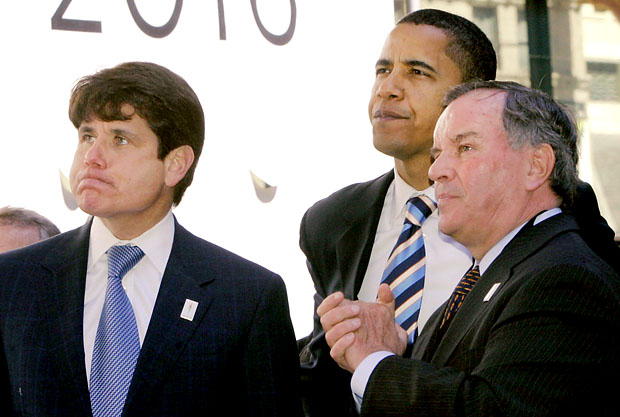Is ‘Chicago’ still the dirtiest word in politics?
By Tony Arnold

Is ‘Chicago’ still the dirtiest word in politics?
By Tony Arnold
The phrase “Chicago-style politics” is one that just won’t go away. It’s been used in this presidential election cycle against Barack Obama and even in elections closer to home in Illinois.
The city of broad shoulders has always been known for equally sharp elbows. But four years ago national Republicans seized on the idea to bash Democrats again and again.
Former New York Mayor Rudy Giuliani used it to criticize then-presidential candidate Barack Obama at the Republican National Convention.
“He immersed himself in Chicago machine politics,” Giuliani said.
Earlier this year, Mitt Romney raised it himself in an ABC News interview.
“It’s Chicago-style politics at its worst and the president promised something better than this when he ran last time,” he said.
Then, just this month, former GE CEO Jack Welch used it to imply the Obama administration faked October’s jobs report.
MSNBC’s Chris Matthews berated Welch for the implication.
“So these Chicago guys had nothing to do with the number coming out today?” Matthews asked.
“Oh, I don’t know that,” Welch replied.
“Well, why’d you say it? ‘These Chicago guys will do anything. They’ll change the numbers.’ You just said it in your Tweet!” Matthews exclaimed.
Welch never did fully explain the Chicago comment, but the allusion is clear. Chicago’s reputation for strong-arm machine politics peaked during the first Daley administration, and was immortalized in Mike Royko’s classic Boss. The city’s legacy of a politics that can be bought and sold continued up through the Rod Blagojevich scandal. And it doesn’t help that corruption cases of public officials continue to pile up. So it’s easy to understand why our town has become a kind of political cliché.
But does the image still match up to reality? I asked some people who actually live here what they thought.
“To me it’s corrupt,” said Claire Holton, who was smoking a cigarette in Daley Plaza one recent morning.
“We elect all these officials to work for us and they’re working for themselves,” she said.
Several other residents I polled had similar feelings. But some things have changed. Including the city’s mayor. In fact, Rahm Emanuel seems conscious of fighting the old perception.
“I want to turn the kind of name that Chicago has, its politics, because I believe in public service and I believe it’s a noble calling and I believe those of us that have the opportunity to serve the public should do it with the highest of ethical standards and conduct,” Emanuel said at a recent news conference announcing a new ethics board.
But if Emanuel wants to change that image, he may have to start closer to home. Even in Illinois, Chicago’s image has been used in an ad airing in the heated congressional race between Republican incumbent Bobby Schilling and his Democratic opponent in western Illinois.
“Why is Cheri Bustos running a Chicago-style false attack on Bobby Schilling?” the ad asks in an ominous voice.
Still, not everyone thinks the Chicago slur still works. Lloyd Betourney is a Democratic campaign consultant based in Chicago’s south suburbs.
“Candidates who use it to muddy up their opponents today really better have another gun in their holster because that one has been long out of bullets. I mean, it’s no longer valid and has really even less relevance today,” Betourney said.
Betourney works on political campaigns both inside and outside Illinois. He said the image of Chicago politics as one dominated by smoke-filled backroom dealings is outdated. And he points out that Chicago is not the only place with a history of bruising machine politics.
“There’s a hit show on HBO, Boardwalk Empire,” he said. “That’s about a Republican machine in the early 1900s. You know, nobody talks about that. Or talks about, ‘Oh, geez. This is Atlantic City politics.‘”
So if Betourney’s right and Chicago’s political image has changed, does the continued use of ‘Chicago-style politics’ create any lasting damage to the city itself?
I put that question to Jack Johnson, whose job it is to think about things like Chicago’s image. Johnson works with the city’s tourism department and he said the whole thing actually adds to the city’s mystique.
“I think it plays into the brand that this is not your average city. We’re a very muscular city,” he said.
Johnson said that if anything, the city’s connection to politics actually brought more people to town after Mr. Obama won the presidency. And he echoed a view of the city that I heard earlier while out asking people about Chicago’s brand of politics.
“We may not get from point A to point B in the most genteel manner, but, you know, in Chicago, you will get from point A to point B and things do get done,” Johnson said.
Things get done. Or as West Side resident Samuel Cummings put it to me: “They get the job did. That’s what matters. They get the job did. When they go through all the bull [expletive], the job get did.”
Cummings may not say it in the most artful, polite way, but he gets his point across.
Kind of like Chicago-style politics.